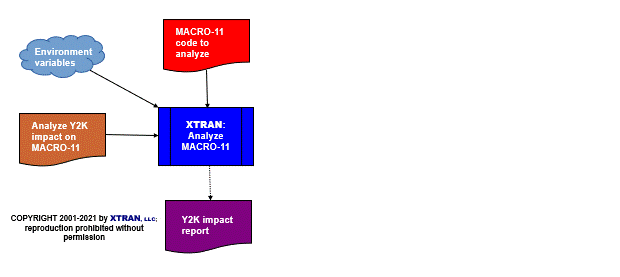XTRAN Example — Analyze Year 2000 (Y2K) Impact on MACRO-11
This example shows how XTRAN rules can analyze
MACRO-11 code in order to identify symbols and contexts that may be a problem
in terms of the Year 2000 (Y2K). The approach is not specific to
MACRO-11; similar XTRAN rules can easily be written
for other computer languages, including other assemblers, 3GLs, and 4GLs.
Click ![]()
![]() for a C / C++ /
Java / C# example and
for a C / C++ /
Java / C# example and ![]()
![]() for a PL/M
example.
for a PL/M
example.
Of course, Y2K has come and gone, but this is an excellent example of XTRAN's analysis power, so we decided to keep it on our Web site.
This example comprises 162 non-comment lines of XTRAN's rules language, which we call "meta-code".
Our meta-code reports each symbol name, text string, and comment that
includes any of the strings year, yr, or
yy (case-insensitively). It also reports any integer or
date $EDMSG format spec it can find.
Rules
XTRAN's rules language, "meta-code", is proprietary and requires a Nondisclosure Agreement. However, the following is an English paraphrase of the meta-code used in this analysis. It is functionally equivalent to the actual meta-code used. NOTE that these rules are COPYRIGHT 2016 by XTRAN, LLC and may not be copied or used in any way without our permission.
For each symbol referenced in module
If it contains "YEAR", "YR", or "YY"
Report it
For each statement in module
If it's a call to $EDMSG
If previous statement loads R1 with address of format string
Get format string via address loaded into R1
If format string contains decimal spec
Report it
If format string contains date spec
Report it
For each of statement's operands
If it's a text string
If it contains "YEAR", "YY", or "YR"
Report it
For each of statement's comments
If it contains "YEAR", "YY", or "YR"
Report it
Close report file
Process Flowchart
Here is a flowchart for this process, in which the elements are color coded:
- BLUE for XTRAN versions (runnable programs)
- ORANGE for XTRAN rules (text files)
- RED for
code - PURPLE for text data files

Input to XTRAN
1 DOYR:: MOV R1,VAR1 2 CMP R1,YRVAR ;NEW YEAR? 3 BLE OLDYR ;IF NOT 4 MOV R1,YRVAR ;YES, UPDATE 5 OLDYR: TST NEW 6 BGT 10$ 7 MOV R1,NEW ;MAYBE NEW YR 8 10$: 9 MOV #EDMBUF,R0 10 MOV #EDMST1,R1 11 MOV #EDMAB1,R2 12 CALL $EDMSG 13 MOV #EDMBUF,R0 14 MOV #EDMST2,R1 15 MOV #EDMAB2,R2 16 JSR PC,$EDMSG 17 RTS PC 18 EDMST1: .ASCIZ /Year = %D/ ;$EDMSG CTL STRING 19 EDMST2: .ASCIZ /Date = %Y/ ;$EDMSG CTL STRING 20 EDMAB1: .WORD 95. ;$EDMSG ARG: YY 21 EDMAB2: .WORD 94. ;$EDMSG ARGS: YY,MM,DD 22 .WORD 12. 23 .WORD 31. 24 EDMBUF: .BLKB 100. ;$EDMSG O/P BUFFER
Output from XTRAN
*** Possible year symbols *** DOYR OLDYR YRVAR *** Possible year text strings and comments *** module.mac(2): Comment may be about year: "NEW YEAR?" module.mac(7): Comment may be about year: "MAYBE NEW YR" module.mac(12): $EDMSG format spec may be for year: "Year = %D" module.mac(16): $EDMSG 2-digit year date format spec: "Date = %Y" module.mac(18): Text string may be about year: "Year = %D" module.mac(20): Comment may be about year: "$EDMSG ARG: YY" module.mac(21): Comment may be about year: "$EDMSG ARGS: YY,MM,DD"